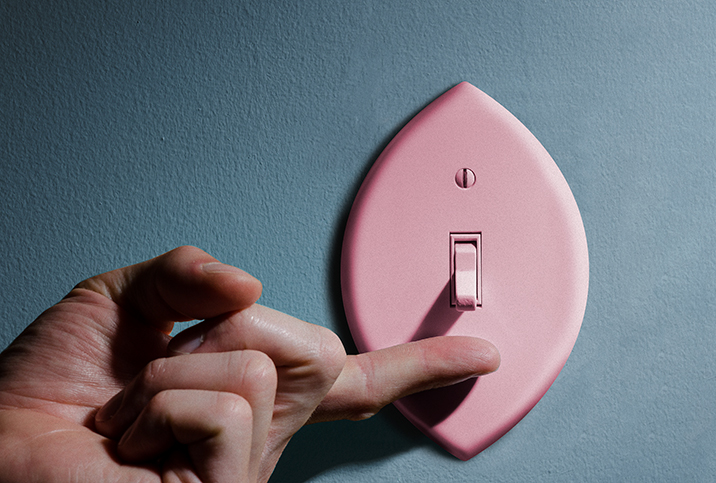Daily Masturbation Can Reduce Your Stress

Even for all the contributions it makes to our lives, masturbation is still rarely discussed. Perhaps it's because masturbation habits can carry stigmas—such as the myths about men becoming addicted to the act or women masturbating because they're not satisfied by their partner.
However, masturbation carries many health benefits across genders, quite contrary to popular misconceptions.
The stigmas of masturbation
Research into the benefits of daily masturbation uncovered an entire section of the medical community desperate to talk about the topic but rarely given the chance.
"We're such a goal-oriented society that we believe that orgasm should be the purpose of sexual activity," said Sue Milstein, founder of Milstein Health Consulting. "And if we're masturbating, then obviously we're missing something from our partner."
The problem with this thinking is, aside from the obvious damage it may inflict on self-image, once women find a partner, they often stop masturbating completely, which cheats their body out of many benefits.
Women who masturbate know they are seen in this light, which prevents women from openly voicing their masturbation habits, even when talking with their closest friends and partners. The unfortunate truth is that these societal perspectives have also shaped our partners' perspectives on masturbation, which continues the cycle of shame and silence.
"I feel that the stigmas surrounding women's health are heavily based in patriarchy, from masturbation to abortion rights," said Tazmine Weisgerber, a training and technical assistance manager with Answer, a New Jersey-based sex education site. "People with power—that is, white, heterosexual, cisgender, able-bodied males—have always made the rules about what women can and cannot do with our bodies, whether it be in the form of laws or societal standards."
The solution to this problem may be simple. Weisgerber recommended educating men and women about sexuality, and for couples to have honest conversations about their sexual needs, preferences and, most importantly, masturbation.
Health benefits
"I recommend regular [daily] masturbation to all of my clients who are not currently recovering from trauma, addiction or impulse difficulties related to sex," said Stephanie P. Bathurst, Ph.D., LCMFT, CLC, CKCT, a board-certified clinical sexologist and AAMFT-licensed marriage and family therapist in Maryland. "Research shows us that regularity of orgasms can help extend the age of onset for menopause, alleviate pain, strengthen pelvic floor muscles that amplify orgasms, help with physical balance and counteract incontinence later in life, prevent cervical infection, diabetes and cardiovascular issues, relieve muscle tension and benefit sleep states."
In addition to the physical benefits, daily masturbation can also relieve stress.
"Masturbation and orgasm[s] cause your brain to release several hormones: Dopamine and oxytocin are two of the most well-known," Weisgerber said. "This release of hormones causes you feelings of happiness and well-being, relieves stress...and can even boost your self-esteem by helping you better connect with yourself."
She explained masturbation also helps us explore our bodies to better understand what we're looking for from our partner. By having these conversations, we can avoid the trial and error of sexual practice and bypass the awkwardness of sexual encounters. These conversations can ultimately make sex more enjoyable for both partners.
Talking with your partner
Communicating about sex can feel disconcerting at first, but once the conversation starts, you might find your partner is happy to open up and discuss their needs. This is a great opportunity to introduce your masturbation schedule, but how and when we approach this conversation is essential to achieving the most constructive outcome.
"I encourage people to talk outside the bedroom when discussing vulnerable and difficult topics. In particular, don't have a difficult conversation about sex in the place you have sex," said Kristen Lilla, LCSW, CST, CSE, CSTS, who is based in Nebraska. "Find a neutral setting, like the kitchen, and talk when you have time to engage in a dialogue. Don't do it just before or after sex."
This conversation is difficult enough, but imagine how you would feel if your partner told you they need to masturbate more often. You could easily interpret this desire as an attack on your sexual abilities and perpetuate the stereotype that masturbation is solely about sexual gratification.
'I encourage people to talk outside the bedroom when discussing vulnerable and difficult topics. In particular, don't have a difficult conversation about sex in the place you have sex.'
"Talk about why you masturbate and why it's important to you," Milstein advised. "But, and this is a big but, be prepared for your partner to possibly feel threatened. And in the case where you are masturbating because your partner isn't meeting your needs, then that's a great opportunity to explain to them what you like and what you want during sex play."
One of the best strategies I use to talk with my partner is sending articles (like this one) to his personal email account. This gives him time to read the article and consider his thoughts. Then, the next time I see him, I just have to say, "Hey, did you get a chance to check out that article I sent you?"
This makes the topic more approachable, and my partner can feel prepared instead of feeling uncomfortable and put on the spot. We've also had time to gather our thoughts, weigh our feelings and do our own research, which allows us to create a thoughtful discussion without the risk of hurt feelings.
Regardless of the why, it's time to end the stigma and allow yourself and your partners to be open about sexual habits. Masturbation isn't only about the orgasm. Now that we know this, let's free ourselves from damaging social pressures by maintaining a daily masturbation practice.


















